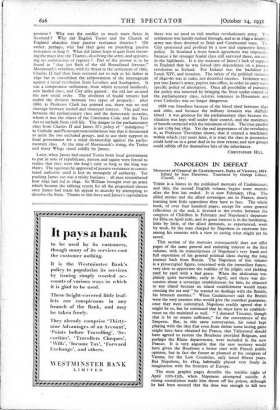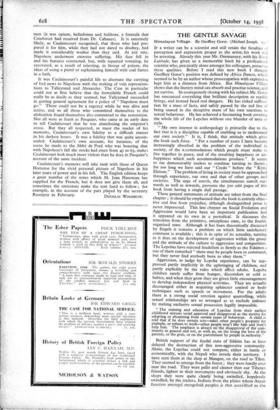NAPOLEON IN DEFEAT _
Memoirs of General de Caulaincourt, Duke of Vicenza, 1814. Edited by Jean Hanoteau. Translated by George Libaire. (Cassell. zis.)
THERE is -a hiatus in the published memoirs of Caulaincourt, and this, the second English volume, begins some months after the first has ended. It is now February, 1814. The allied armies and the allied sovereigns are in France, slowly learning how little opposition they have to face. The whole book, of over four hundred pages, except for some general reflections at the end, is devoted to the events between the congress of Chatillon in February and Napoleon's departure for Elba on April zoth, and its great interest is in the hardening, little by little, of the allied demands, as experienced, week by week, by the man charged by Napoleon to represent him among his enemies with a view to saving what might yet be saved.
This section of the memoirs consequently does not offer pages of the same general and enduring interest as the first volume, with its transcriptions of Napoleon's very frank and full exposition of his general political ideas during the long journey back from Russia. The Napoleon of this volume is a preoccupied figure, concerned with the immediate future, very slow to appreciate the realities of his plight, and yielding yard by yard with a bad grace. When the abdication was plainly quite inevitable, early in April, and there was dis- cussion about a sovereign establishment for him, he objected to any, island because an island establishment would mean crossing the sea and " he wanted no dealings with the British, his bitterest enemies." When Caulaincourt said the British were the very enemies who would give the soundest guarantee, once they were committed, Napoleon readily agreed that it might be so, but he continued that he must have an establish- ment on the mainland as well " I demand Tuscany, though that is by no means sufficient," for the convenience of the Empress. But, in this same conversation, his mind kept playing with the idea that even from defeat 'some lasting gains might have have obtained for France, that Talleyrand should have agreed to restore the Bourbons provided Belgium, and perhaps the Rhine departments, were included in the new France. It is very arguable that the new territory would have given the Bourbons a better start with French public opinion, but in fact the future as planned at the congress of Vienna, for the Low Countries, only lasted fifteen years. But Napoleon, by 1814, habitually played very freely in imagination with the frontiers of Europe.
The most graphic pages describe the terrible night of April izth-13th, when Napoleon attempted suicide. A strong constitution made him throw off the poison, although he had been assured that the dose was enough to kill two men (it was opium, belladonna and helibore, a formula that Condorcet had received from Dr. Cabanes). It is extremely likely, as Caulaincourt recognised, that those who had pre- pared it for him, while they had not dared to disobey, had made it considerably weaker than they said. At any rate, Napoleon underwent extreme suffering. His face fell in and his features contracted, but, with repeated vomiting, he recovered, as a result of rejecting, in favour of poison, the ideas of using a pistol or asphyxiating himself with coal fumes in a bath.
It was Caulaincourt's painful life to alternate the carrying of bad news to Napoleon with the making of vain representa- tions to Talleyrand and Alexander. The Czar in particular could not at first believe that the formidable French could really be as docile as they seemed, but Talleyrand succeeded in getting general agreement for a policy of " Napoleon must go." There could not be a regency while he was alive and active, and so all those who committed themselves to the abdication found themselves also committed to the restoration. Not all were as frank as Pasquier, who came at an early date to tell Caulaincourt that he was abandoning the emperor's cause. But they all respected, as must the reader - of his memoirs, Caulaincourt's own fidelity to a difficult master in his darkest hours. It was a fidelity that was quite uncon- cealed. Caulaincourt's own account, for instance, of the scene he made to the Abbe de Prad who was boasting that with Napoleon's fall the stocks had risen from 45 to 63, makes Caulaincourt look much more violent than he does in Pasquier's account of the same incident.
Caulaincourt's memoirs will take rank with those of Queen Hortense for the vivid personal picture of Napoleon in his later years of power and in his fall. The English edition keeps a great number of the notes which M. Jean. Hanoteau has supplied for the French, but it does not give them all, and sometimes the omissions make the text hard to follow.; for example, in the account of the part played by the secretary



















































 Previous page
Previous page